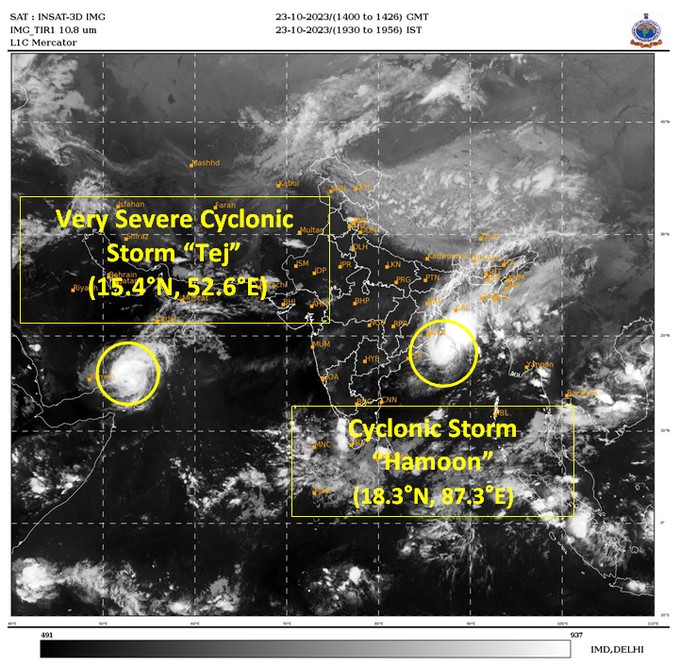
'Hamoon' cyclone

27.10.2023
'Hamoon' cyclone , Daily Current Affairs , RACE IAS : Best IAS Coaching in Lucknow
|
For Prelims: About Cyclone (Types),Important points,Naming of cyclone,The names of cyclones are proposed |
Why in the news?
According to the Indian Meteorological Department, cyclonic storm 'Hamoon' has intensified into a severe cyclonic storm over the north-western Bay of Bengal.
Important points:
- The name 'Hamoon' has been given to this cyclonic storm by Iran.
- The word 'Hamun' is a Persian word that refers to inland desert lakes or marshlands.
- Cyclones Tej and Hamoon are considered to be twin cyclones that developed over the northern Indian Ocean.
- Cyclone Tej was named by India.
- Earlier such twin cyclones 'Luban' and 'Titli' were seen in 2018.
- After Hamon, the cyclone likely to hit India may be named 'Midhili' by Maldives.
About Cyclone:
- A cyclone is a pattern of winds (or air masses) that circulate around a low pressure system.
- It rotates counterclockwise in the Northern Hemisphere and clockwise in the Southern Hemisphere.
- It is usually associated with wet and stormy weather.
- There are two types of cyclones:
- tropical cyclone and
- Extratropical cyclones (also called temperate cyclones)
1.Tropical Cyclone:
- It is an intense circular storm that originates in warm tropical oceans.
- It is characterized by low atmospheric pressure, strong winds and heavy rainfall.
- These are formed over slightly warm sea water.
- For a cyclone to form, the temperature of the upper layer of the ocean, to a depth of about 60 metres, must be at least 28°C.
- The periods April–May and October–December are favorable for cyclones.
- Then, low levels of air over the water require a 'counter-clockwise' rotation (in the Northern Hemisphere; clockwise in the Southern Hemisphere).
- During these periods, there was an ITCZ in the Bay of Bengal.
2.Extratropical cyclone:
- It occurs in temperate regions and high latitude regions, although it has been known to originate in polar regions.
- They are active over the mid-latitude region between 35° and 65° latitude in both hemispheres.
- The direction of movement is from west to east and is more pronounced during the winter season.
Naming of cyclone:
- Tropical cyclones that form over different ocean basins are named by centers that are associated with the area of the cyclone in question such as Regional Specialized Meteorological Centers (RSMC) and Tropical Cyclone Warning Centers (TCWC).
- There are six regional centers across the world, including the India Meteorological Department's RMSC, and six TCWCs responsible for naming cyclones as well as issuing advisories.
- In tropical regions, a cyclone is named when it is determined to have attained cyclonic storm intensity, with wind speeds of 65 kilometers per hour (40 mph).
- These names have been selected from the new roster provided by the Regional Specialized Meteorological Center in New Delhi around mid-2020.
- If the tropical cyclone enters the basin from the western Pacific, it will keep its initial name.
The names of cyclones are proposed in alphabetical order and are used in that order.
- The names of the countries which are affected by the cyclones formed in the Arabian Sea and the Bay of Bengal are as follows - 1) Bangladesh, (2) India, (3) Iran, (4) Maldives, (5) Myanmar. , (6) Oman, (7) Pakistan, (8) Qatar, (9) Saudi Arabia, (10) Sri Lanka, (11) Thailand, (12) United Arab Emirates, (13) Yemen.
- The names are chosen in a way that assures neutrality in its political and religious nature. Naming storms is a lengthy process and involves neutral officials. It is ensured that the names do not hurt the sentiments of any community.
Source:Indian Express